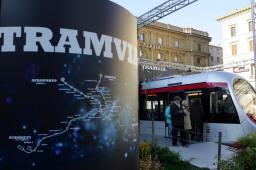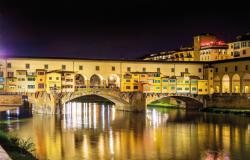A referendum on Sunday on whether or not to block the building of a tramline system which would pass through the city's historic center failed to reach a quorum.
Nevertheless, of the almost 40% of registered voters who did cast ballots, 53.84% voted against the line and 46.16% voted in favor.
The project to build the tramline is backed by the city government, as a means to reduce traffic and air pollution, but opposed by a cross section of political, cultural and environmental groups which claim that it would spoil the nature of the city and be an affront to its monuments.
The greatest objection is over the line running alongside the Baptistry of St John, one of the oldest and most revered buildings in the city, and close to the Duomo, the Cathedral of Santa Maria del Fiore, before turning up the central Via Cavour.
The project split the city politically with the camps of those opposed and those in favor cutting across party lines.
Despite the fact that no quorum was reached, promoters of the referendum still claimed victory and demanded that the project be stopped and that Mayor Leonardo Domenici resign.
''After this defeat Domenici should resign because he sought a political verdict and it came out against his administration. It was not just the people of Florence who moved to give him the boot, but the whole world,'' said referendum organizer Mario Razzanelli.
Because a quorum was not reached, the municipal assembly will not be obliged to debate the question. However, there were calls on Monday from both camps for dialogue to try and reunited a divided city.
''The fact that one Florentine out of five voted against this project is sufficient to take into account their concerns and pay particular attention to the environmental impact of the tramline on the environment and the timetable for its completion,'' observed Ermete Realacci, a Tuscan MP and the president of the Legambiente environment group in favor of the project
''In fact, the outcome of the vote was also influenced by the disturbance which construction of the tramline will create,'' he added.
On the eve of Sunday's vote, Mayor Domenici accused those opposed to the tram of exaggerating risks to the monuments and of spreading false and misleading information about the project
According to the mayor, debate over the project ''has not been positive because it has been focused on sabotaging the plan rather than shedding light on the pros and cons''.
''The multitude of lies which have been spread is outrageous and certainly does no honor to such a civilized, educated and intelligent city as ours,'' Domenici said.
''This situation is a metaphor for the paralysis and stalemate which our country finds itself in today,'' he added.
Among those opposed to the tram is former environment minister Carlo Ripa di Meana who defined the project as ''irrational insanity, a fury of destruction.
''The technology chosen was wrong, as was the itinerary''.
Ripa di Meana, an-ex leader of Italy's Green party and currently head of the Rome chapter of the conservation organization Italia Nostra, added that it was ''a grave attack on the historic center of Florence''.
Those opposed to the tramline include opera-pop crooner Andrea Bocelli, director Franco Zeffirelli and ex-culture minister Vittorio Sgarbi.
Among those in favor are former national police chief Pierluigi Vigna and astrophysicist Franco Pacini.
An appeal in favor of the tram project was presented by 35 leading international scientists, scholars and environmental activists including Jeremy Rifkin, Barry Commoner, Daniel Cohn-Bendit and architect John Tillman Lyle.
The appeal highlighted the fact that ''Italy is third in Europe for the emission of carbon dioxide and it is still far from achieving the minimum goal set down for it in the Kyoto protocol''.
''Florence, a city of art of universal value, is seriously threatened by the impact traffic has on the environment, health and society. Florence has more cars than any other city in Italy: 1,140 vehicles per 1,000 inhabitants compared to 1,081 in Rome, 913 in Naples and 893 in Milan,'' the appeal said.









